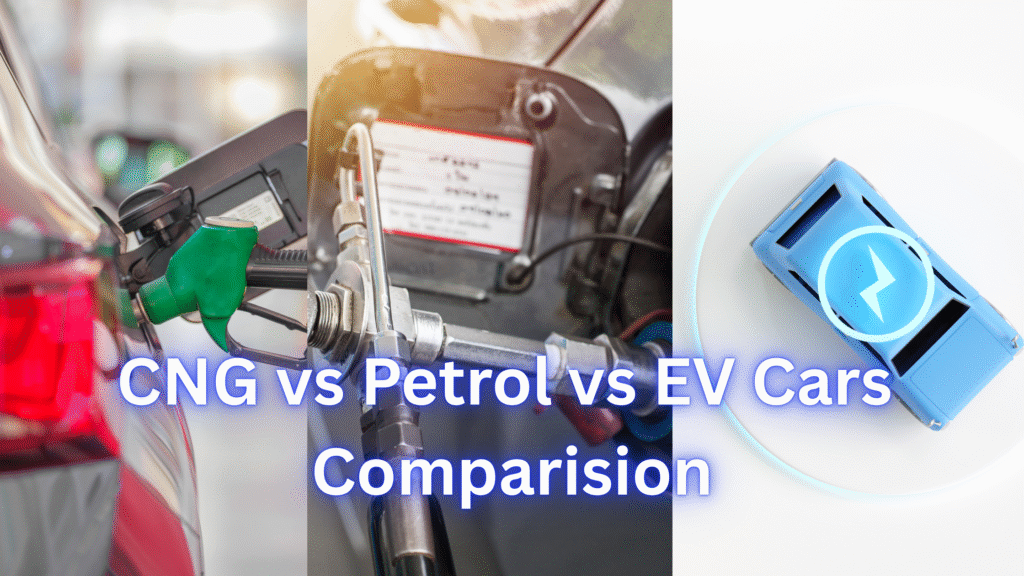Hey friends,
Are you confused about CNG, petrol, and EV cars?
If you’re planning to buy a new car in 2025, you’re probably asking the big question: are you confused about CNG vs. petrol vs. EV cars?
Should I go with a CNG car, stick with petrol, or make the switch to electric (EV)?
Each fuel type has its pros and cons—from fuel efficiency and running cost to eco-friendliness and maintenance. In this guide, we’ll break down the real differences between CNG, petrol, and EV cars so you can choose what’s right for your lifestyle and budget.
👉 Looking for the Top 10 EV Cars in India in 2025?
1. Fuel Cost Comparison of Petrol vs CNG vs EV (Running Cost Per KM)
| Fuel Type | Approx. Cost per KM | Fuel Price (2025 avg) |
|---|---|---|
| Petrol | ₹6–₹8/km | ₹100–₹115/litre |
| CNG | ₹2.5–₹3.5/km | ₹75–₹85/kg |
| EV | ₹1.5–₹2/km | ₹8–₹10/unit (electricity) |

✅ EVs are the cheapest to run, followed by CNG. Petrol is the most expensive daily driver in 2025.
2. Maintenance & Service Cost
- Petrol cars are easier to maintain due to the wide service support and simple mechanics.
- CNG cars need more regular checks (especially for the CNG tank), but parts are affordable.
- EV cars have fewer moving parts—no oil changes, no engine problems—so long-term maintenance is the cheapest among the three.
👉 Read: EV Car Buying Guide 2025—Price, Range & Charging Tips
3. Environmental Impact
| Fuel Type | Emissions | Eco-Friendliness |
|---|---|---|
| Petrol | ❌ High CO₂ emissions | Poor |
| CNG | ✅ Lower than petrol | Moderate |
| EV | ✅ Zero tailpipe emissions | Best |
EVs are clearly the best for the environment, especially if charged from renewable sources. CNG is cleaner than petrol but still emits carbon.
4. Refuelling & Charging Convenience
- Petrol wins here—available everywhere, anytime.
- CNG stations are growing but are still limited in some states.
- EV charging is improving fast—major cities now have fast chargers (see PlugShare to check your area), and home charging is a huge plus for EV owners.
👉 Want to install an EV charger at home? Read how to do it here → Tata Power EZ Charge
5. Purchase Price & Affordability
| Fuel Type | Starting Price Range (India 2025) |
|---|---|
| Petrol | ₹5 lakh–₹20 lakh |
| CNG | ₹5 lakh–₹20 lakh |
| EV | ₹6 lakh–₹12 lakh |
- CNG and petrol are still more affordable upfront.
- EVs have higher starting prices but offer huge savings in running costs and lower maintenance over time.
- Government subsidies on EVs can reduce upfront prices.
6. Driving Experience
- Petrol cars offer smooth, quick acceleration and a traditional feel.
- CNG cars often feel underpowered, especially with AC on.
- EVs deliver instant torque, quiet operation, and smoother performance—ideal for city traffic.
Final Comparison: Petrol vs. CNG vs. EV: Which Fuel Type is Best for You in 2025?
| Need | Best Option |
|---|---|
| Lowest running cost | ✅ EV |
| Cheapest to buy | ✅ Petrol |
| Clean + budget-friendly | ✅ CNG |
| Smoothest drive | ✅ EV |
| Best highway performance | ✅ Petrol/EV LR |
| Daily city driving | ✅ EV / CNG |
✅ Final Thoughts
Each fuel type has its own advantage. If you’re tight on budget and don’t drive too much, CNG cars are a good middle ground. If you want long-term savings and care about the environment, EVs are the smartest choice in 2025, especially with growing fast-charging support, cleaner designs, and lower maintenance.
Petrol cars still hold their place for flexibility and initial affordability, but they’re becoming expensive to maintain and run.
- Top 10 EV Cars in India 2025—Price, Range, Charging Time
- EV Car Buying Guide 2025—Tips for First-Time Buyers
- Best EV Cars Under ₹15 Lakh in India
I hope you find the right guidance and enjoy the article. If you have any queries or want to ask any questions, put them in the comment box. I will be happy to reply to your comment and any help regarding WordPress, blogs, articles, and also car questions. And if you have any suggestions, please put them in the comment box.